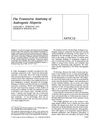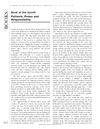ILC1-like cells may contribute to hair loss in alopecia areata.
ILC1-like cells may contribute to hair loss in alopecia areata and could be new treatment targets.
7 citations,
March 2022 in “The FASEB journal” Adult mice with CBS deficiency show minimal health issues and normal lifespan despite high homocysteine levels.
7 citations,
May 2021 in “Clinical Case Reports” Alopecic and aseptic nodules of the scalp are rare, treatable, and often resolve with doxycycline or on their own.
3 citations,
February 2021 in “FEBS open bio” Camellia japonica extract may improve scalp health and promote hair growth.
 November 2016 in “Hair transplant forum international”
November 2016 in “Hair transplant forum international” Hair transplant surgery should only be done by licensed professionals, as many states don't allow unlicensed personnel to perform it.
 1 citations,
December 2023 in “The journal of investigative dermatology/Journal of investigative dermatology”
1 citations,
December 2023 in “The journal of investigative dermatology/Journal of investigative dermatology” Keeping β-catenin levels high in mammary cells disrupts their development and branching.
117 citations,
April 2008 in “Developmental biology” Ectodysplasin inhibits Wnt signaling to help form hair follicles.
 96 citations,
September 2021 in “International Journal of Molecular Sciences”
96 citations,
September 2021 in “International Journal of Molecular Sciences” Chitosan, a natural substance, can be used to create tiny particles that effectively deliver various types of drugs, but more work is needed to improve stability and control of drug release.
81 citations,
February 2014 in “EMBO molecular medicine” Activating Nrf2 in skin cells causes skin disease similar to chloracne in mice.
 30 citations,
February 2022 in “Pharmaceutics”
30 citations,
February 2022 in “Pharmaceutics” 3D bioprinting improves wound healing by precisely creating scaffolds with living cells and biomaterials, but faces challenges like resolution and speed.
29 citations,
December 2004 in “Developmental biology” cDermo-1 causes dense skin, feathers, and scales in chickens.
22 citations,
December 2015 in “The journal of investigative dermatology/Journal of investigative dermatology” A mouse gene mutation increases the risk of skin cancer.
8 citations,
May 2020 in “International journal of biological macromolecules” Certain treatments can increase protein binding to natural hair but are less effective on permed hair.
2 citations,
July 2017 in “Oncology Letters” Lacking cyclin D3 reduces skin cancer growth without affecting normal skin cell growth.
 1 citations,
July 2023 in “Journal of Animal Science and Biotechnology”
1 citations,
July 2023 in “Journal of Animal Science and Biotechnology” The SOSTDC1 gene is crucial for determining sheep wool type.
 July 2023 in “Journal of Clinical Medicine”
July 2023 in “Journal of Clinical Medicine” The document concludes that understanding hair follicle histology and the hair cycle is crucial for diagnosing alopecia.
 April 2024 in “Histochemistry and cell biology”
April 2024 in “Histochemistry and cell biology” N-acetylcysteine may prevent hair loss caused by chemotherapy.
 October 2022 in “Dermatology practical & conceptual”
October 2022 in “Dermatology practical & conceptual” Most injecting drug users in the study had hepatitis C and skin problems, which moderately affected their quality of life.

PCOS phenotypes A and B are more common and linked to higher health risks in women from the Ecuadorian Andes.
 27 citations,
September 2017 in “Acta dermato-venereologica”
27 citations,
September 2017 in “Acta dermato-venereologica” Adults with certain skin conditions may have higher levels of inflammation in their body.
Scalp melanoma is often diagnosed late in people with hair loss, leading to worse outcomes.
 40 citations,
November 2011 in “American Journal of Human Biology”
40 citations,
November 2011 in “American Journal of Human Biology” Stress from being transgender is linked to higher blood pressure at night and more inflammation, which may affect heart health.
1 citations,
January 2022 in “Indian Journal of Dermatology” Bullous pyoderma gangrenosum can develop on cesarean scars and may require steroids for treatment.
1 citations,
August 2022 in “Journal of Cosmetic Dermatology” Using both 5% spironolactone and 5% minoxidil together is safe and more effective for treating hair loss.
 42 citations,
December 1990 in “The Journal of Dermatologic Surgery and Oncology”
42 citations,
December 1990 in “The Journal of Dermatologic Surgery and Oncology” The study found that horizontal sections of scalp biopsies are better for analyzing hair loss, showing fewer hairs and more fine hairs in balding areas.
 3 citations,
July 2022 in “Indian journal of dermatology, venereology, and leprology”
3 citations,
July 2022 in “Indian journal of dermatology, venereology, and leprology” Patients with alopecia areata have higher oxidative stress and lower antioxidant levels.
 November 2008 in “Medical & surgical dermatology”
November 2008 in “Medical & surgical dermatology” A device was made in 2008 to measure hair loss severity. Other findings include: frizzy mutation in mice isn't related to Fgfr2, C/EBPx marks preadipocytes, Cyclosporin A speeds up hair growth in mice, blocking plasmin and metalloproteinases hinders healing, hyperbaric oxygen helps ischemic wound healing, amniotic membranes heal wounds better than polyurethane foam, rhVEGF165 from a fibrin matrix improves tissue flap viability and induces VEGF-R2 expression, and bFGF enhances wound healing and reduces scarring in rabbits.
 139 citations,
July 1991 in “Journal of The American Academy of Dermatology”
139 citations,
July 1991 in “Journal of The American Academy of Dermatology” Understanding hair follicle anatomy helps diagnose hair disorders.
 1 citations,
September 2003 in “Journal of the Royal Society of Medicine”
1 citations,
September 2003 in “Journal of the Royal Society of Medicine” The book is a detailed guide on hair and scalp diseases, useful for dermatopathologists.















